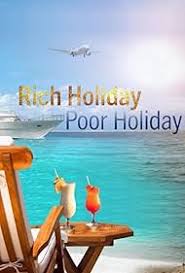
The Significance of Holiday Experiences
Holidays are a cherished time for individuals and families, providing a break from the daily rigours of life. However, the nature of these holidays can vary significantly depending on one’s financial status. The distinction between a ‘rich holiday’ and a ‘poor holiday’ highlights broader societal issues related to wealth disparity and access to exclusive experiences.
Defining Rich Holidays
Rich holidays typically refer to experiences characterised by luxury and extravagance. These trips often include elements such as staying in five-star accommodations, dining at high-end restaurants, and engaging in exclusive activities like private yacht charters or bespoke tours. According to a recent report by the Association of British Travel Agents (ABTA), the wealthy are leaning towards personalised travel experiences, indicating a shift towards curated journeys that prioritize comfort and individuality.
The Poor Holiday Experience
Conversely, poor holidays are often marked by limited budgets and constrained options. Travellers may opt for more economical accommodations, like hostels or budget hotels, and might rely on affordable dining options or self-catering. A survey conducted by the Office for National Statistics (ONS) revealed that nearly 40% of UK families report cutting back on holiday spending, with many preferring local or domestic trips as a way to save money while still taking a break from routine.
Key Differences in Holiday Experiences
The differences between rich and poor holidays extend beyond just accommodations and dining. Luxury holidays often include tailored experiences, such as guided city tours or wellness retreats, which can significantly elevate the holiday experience. In contrast, budget travellers generally rely on public transport and free attractions, which, while enriching in their own right, may not offer the same level of comfort and convenience.
Effects on Travel Preferences
Research suggests that these experiences can influence not only individual preferences but also broader travel trends. Rich holidaymakers are increasingly opting for unique destinations that offer luxury services, contributing to a booming luxury travel market. Meanwhile, budget-focused travellers often prioritize travel deals and discounts, encouraging a rise in budget airlines and off-peak holiday planning.
Conclusion: The Importance of Inclusivity
In conclusion, the dichotomy of rich versus poor holidays reflects wider economic disparities and varies greatly based on personal circumstances. While luxury holidays may provide exclusive experiences, it is equally essential to acknowledge and enrich the more budget-friendly options, as they often uncover the beauty and resilience of travel. As travel continues to evolve in a post-pandemic world, understanding these differences can help foster greater inclusivity within the industry, ensuring that everyone has the chance to explore and enjoy new experiences, regardless of financial ability.
You may also like

Discovering the Beauty and Culture of Norway

Exploring Monmouth: History, Attractions and Community

Understanding Glasgow Airport and Its Significance
SEARCH
LAST NEWS
- Remembering Wendy Richard: The Promise to Co-Star Natalie Cassidy
- How Did Anglian Water Achieve an ‘Essentials’ Rating for Mental Health Accessibility?
- Shai Hope Leads West Indies in T20 World Cup Clash Against South Africa
- What We Know About Weston McKennie: Future at Juventus and Past at Leeds
- What We Know About the Upcoming Live Nation Antitrust Trial